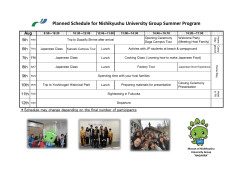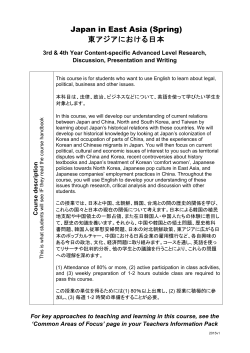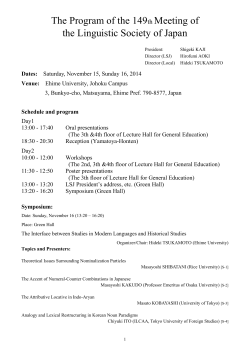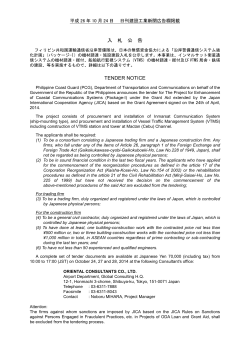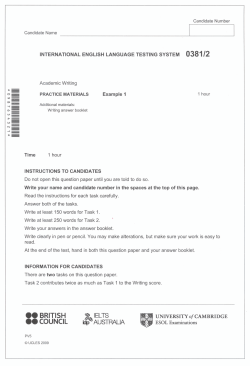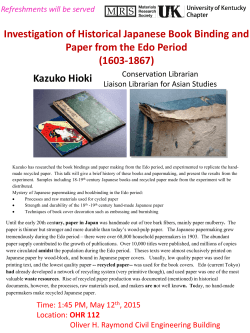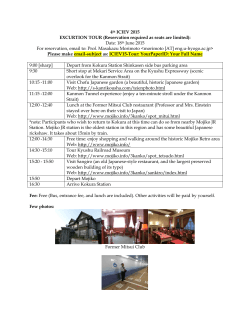
- Chigusa Kurumada
5/5/15 CHIGUSA KURUMADA Department of Brain and Cognitive Sciences, University of Rochester Rochester, New York 14627-0268 ckurumada@bcs.rochester.edu chigusakurumada.jimdo.com +1 650-384-9344 Research Interests I am interested in the way adults and children find coherent patterns in input signals and induce linguistic representations – such as words and meanings. My recent work focuses on roles of the adaptive nature of the human cognitive system in language comprehension, investigating how it navigates variability in prosodic information and achieves robust pragmatic inferences. Bridging topics on child language acquisition and psycholinguistics, I explore the mechanism of language learning and use throughout the lifespan. Academic appointment 2014Assistant Professor, Department of Brain and Cognitive Sciences, University of Rochester 2013 - Postdoctoral research fellow, Department of Brain and Cognitive Sciences, University of Rochester Education 2008 -2013 Ph.D., Linguistics, Stanford University Dissertation: Navigating variability in the linguistic signal: Learning to interpret contrastive prosody Committee members: Eve V. Clark (chair), Dan Jurafsky, Meghan Sumner, Michael C. Frank (Psychology) 2006 2004 MA, Arts and Sciences, University of Tokyo, Tokyo, Japan BA, Cross Cultural Studies, Kyoto Prefectural University, Kyoto, Japan Workshop Grant 2015 $11,000 NSF BCS-1451751 Workshop: Experimental and Theoretical Advances in Prosody – Variability in prosody, May, 2015 – University of Illinois, Urbana Champaign (Co-PI: Duane Watson) Scholarship/fellowship/Awards 2014 College Course Development Fellowship, Center for Excellence in Teaching and Learning, University of Rochester 2014 Jerrold J. Katz Young Scholar Award at the 26th CUNY conference on sentence processing 2013 -2014 Postdoctoral research fellowship, Japan Society of Promotion of Sciences 2013 Student travel grant, The 26th CUNY conference on human sentence processing, Columbia, SC. 2011 Paula Menyuk travel grant, Boston University Conference of Child Language and Development. 2011 Conference travel grant from Center for East Asian Studies at Stanford University 1 5/5/15 2011 Student Travel Award, The 34th annual meeting of the Cognitive Science Society 2011 2008-13 Ishizaka Foundation Scholarship 2008-13 Graduate fellowship, Stanford University Publications [MA Thesis] Kurumada, C. (2006). A developmental study on Japanese children’s narrative discourse. Department of Language and Information Sciences. University of Tokyo. [Work in progress] Kurumada, C., & Brown, M., & Tanenhaus, M. K. (in prep). Probabilistic inferences and adaptation in pragmatic interpretation of contrastive prosody. Kurumada, C., & Pogue, A. (in prep). Alternatives in first language acquisition. [Journal publications] Kurumada, C., & Clark, E. V. (under review). Pragmatic inferences in context: Learning to interpret contrastive prosody. Kurumada, C., & Jaeger, T. F. (in press). Communicative efficiency in language production: Case-marker omission in Japanese. Journal of Memory and Language. Kurumada, C., Brown, M., Bibyk, S., Pontillo, D., & Tanenhaus, M. K. (2014). Is it or isn’t it: Listeners make rapid use of prosody to infer speaker meanings. Cognition, 133, 335-342. Kurumada, C., Meylan, C. S., & Frank, M. C. (2013). Zipfian frequency distributions facilitate word segmentation in context. Cognition, 127, 439-453. [Peer-reviewed chapters in Edited volumes] Clark, E. V., & Kurumada, C. (2013). 'Be brief': From necessity to choice. In L. Goldstein (Ed.). Brevity. Oxford University Press. Kurumada, C., & Iwasaki, S. (2012). Negotiating desirability: The acquisition of the uses of ii 'good' in mother-child interactions in Japanese. The proceedings of the 19th conference of Japanese Korean Linguistics (pp.511-525). Kurumada, C. (2009). The acquisition and development of the topic marker wa in L1 Japanese: the role of NP-wa? in child-mother interaction. In Corrigan, B., Moravcsik, E., Ouali, H., and Wheatly, K (eds), Formulaic language Vol.2 (Typological studies in language). Amsterdam: John Benjamins (pp. 347-374). Kurumada, C. & Fujii, S. (2009). Creating storylines: Acquisition of topicalization and aspect in narratives by Japanese children. In Inagaki, S et.al (eds). Studies in language sciences 8, Tokyo: Kurosio Publishers (pp.93-108). [Peer-reviewed conference proceedings] Pogue, A., Kurumada, C., & Tanenhaus, M. K. (2015). Speaker-specific generalization of pragmatic inferences based on prenominal adjectives. Proceedings of the 37th Annual Meeting of the Cognitive Science Society. 2 5/5/15 Kurumada, C., Brown, M., Bibyk, S., Pontillo, D., & Tanenhaus, M. K. (2014). Rapid adaptation in online pragmatic interpretation of contrastive prosody. Proceedings of the 36th Annual Meeting of the Cognitive Science Society. Kurumada, C., Brown, M., Bibyk, S., Pontillo, D., & Tanenhaus, M. K. (2013). Incremental processing in the pragmatic interpretation of contrastive prosody. Proceedings of the 35th Annual Meeting of the Cognitive Science Society. Kurumada, C., & Jaeger, T. F. (2013). Communicatively efficient language production and case-marker omission in Japanese. Proceedings of the 35th Annual Meeting of the Cognitive Science Society. Kurumada, C. (2013). Contextual inferences over speakers’ pragmatic intentions: Preschoolers’ comprehension of contrastive prosody. Proceedings of the 35th Annual Meeting of the Cognitive Science Society. Sumner, M., Kurumada, C., Gafter, R., & Tice, M. (2013). Phonetic variation and the recognition of words with pronunciation variants Proceedings of the 35th Annual Meeting of the Cognitive Science Society. Kurumada, C., & Brown, M., & Tanenhaus, M. K. (2012). Pragmatic interpretation of contrastive prosody: It looks like speech adaptation. The proceedings of the 34th annual meeting of the Cognitive Science Society, Sapporo, Japan, August. Meylan, S., Kurumada, C., Börschinger, B., Johnson, M., and Frank, M. C. (2012). Modeling online word segmentation performance in structured artificial languages. The proceedings of the 34th annual meeting of the Cognitive Science Society. Kurumada, C., Meylan, S., & Frank, M. C. (2011). Zipfian word frequencies support statistical word segmentation. The proceedings of the 33th annual meeting of the Cognitive Science Society. [Invited contributions to edited volumes] Tanenhaus, M. K., Kurumada, C., & Brown, M. (under review). Prosody and intention recognition. Kurumada, C., & Arnon, I. (2014). Interaction in language acquisition. In Arnon, I., Casillas, M., Kurumada, C., & Estigarribia, B. (eds). Language in interaction: Studies in honor of Eve V. Clark. (pp. 1-10). John Benjamins. [Editing experiences] Arnon, I., Casillas, M., Kurumada, C., & Estigarribia, B. (2014). Language in interaction: Studies in honor of Eve V. Clark. Trends in Language Acquisition Research. John Benjamins. [Invited Talks and tutorials] Kurumada, C. (2014). Roles of contextual inferences in the acquisition of English contrastive prosody. An invited talk at the workshop on the role of prosody in language learning: Stress, tone, and intonation. Macquarie University, Sydney. December 8th. Kurumada, C. (2014). Perception and interpretation of speech prosody. An invited tutorial at the 15th Australasian international speech science & technology 3 5/5/15 conference. University of Canterbury, Christchurch, December 3rd. [Conference Presentations (Paper Presentations)] Pogue, A., Kurumada, C., & Tanenhaus, M.K. (2015). Speaker-specific pragmatic generalizations based on under- vs. over-informative utterances. Experimental Pragmatics 2015. Chicago, IL. Pogue, A., Kurumada, C., & Tanenhaus, M.K. (2015). Exploring expectations based on speaker-specific variation in informativity. Formal and experimental pragmatics: methodological issues of a nascent liaison. Berlin, Germany. Kurumada, C., Brown, M., Bibyk, S., Pontillo, D., & Tanenhaus, M. K. (2014). Expectation-adaptation in the incremental interpretation of contrastive prosody. The 27th CUNY conference of sentence processing. The Ohio State University, March 13th. Kurumada, C., Brown, M., Bibyk, S., Pontillo, D., & Tanenhaus, M. K. (2013). Is it or isn’t it: Listeners make rapid use of prosody to infer speaker meanings. Annual meeting of the New Zealand linguistics society. Christchurch, November 21st. Kurumada, C., & Brown, M., & Tanenhaus, M.K. (2013b). Comprehension and acquisition of contrastive prosody: Rational inference helps adults and children cope with noisy input. The 26th CUNY conference of sentence processing, University of South Carolina, March 24th. Kurumada, C., & Brown, M., & Tanenhaus, M.K. (2013a). Rapid adaptation in pragmatic interpretation of contrastive prosody. LSA annual meeting, Boston, January 5th. Kurumada, C., & Jaeger, T. F. (2012). Communicatively efficient language production and case-marker omission in Japanese. LSA annual meeting, Portland, January 6th. Kurumada, C., Meylan, S., & Frank, M. C. (2011). Statistical word segmentation of Zipfian frequency distributions. BUCLD 36, Boston, November 4th. Kurumada, C. & Jaeger, T. F. (2011). Beyond animacy: Probability-based effects on the case-marker omission in Japanese. The workshop on structural alternations: Speaker and hearer perspectives, University of Groningen, Netherlands, August 24th. Kurumada, C. (2011). Topicality and aspect marking: A case of Japanese narrative and conversational discourses. DGfS 2011, University of Gottingen, Germany, February 27th. Kurumada, C. (2011). Syntactic context affects probability estimation: Evidence from Japanese relative clauses. LSA annual meeting, Pittsburgh, January 6th. Gafter, R., Kurumada, C., Tice, M., & Sumner, M. (2011). Integrating frequency, formality, and phonology in the perception of speech. LSA annual meeting, Pittsburgh, January 8th. Kurumada, C., & Iwasaki, S. (2009). Negotiating desirability: The acquisition of the uses of ii 'good' in mother-child interactions in Japanese. The 19th Japanese Korean Linguistics, University of Hawaii at Manoa, November 12th. Takubo, Y., Hayashi, Y., Motoki, T., & Kurumada, C. (2009). The digital museum 4 5/5/15 project for the documentation of Ikema Ryukyuan. 1st International Conference on Language Documentation and Conservation (ICLDC), University of Hawaii, Manoa. March, 13th. Kurumada, C., & Iwasaki, S. (2008). Parallel acquisition of lexical meanings and pragmatic functions: The case of Japanese adjective ‘ii’. The 10th meeting of the Japanese Society of Language and Sciences, Shizuoka Prefectural University, July 12th. Kurumada, C. (2007). Boshi intarakushon ni miru kakari-jyoshi wa no kino to hattatsu [A study on the development of topic-particle wa in Japanese in child-mother interaction]. The 9th Japanese Society of Language and Sciences, Miyagi Women’s Christian University, July 7th. Kurumada, C. (2007). The interactional origin of the Topic-particle wa in Japanese. Linguistics symposium on formulaic language, University of Milwaukee, April 18-21st. Kurumada, C. (2006). A developmental analysis on the particle “wa” in Japanese. The inaugural conference of Japanese Studies Association in Southeast Asia (JSA-ASEAN), National University of Singapore, October 12-14th. Kurumada, C. & Fujii, S. (2006). Constructing storylines: A constructional approach to the structure and development of narratives. The 4th International conference on construction grammar, Tokyo University, September, 2nd. Kurumada, C. & Fujii, S. (2006). Creating storylines: A developmental study on Japanese children’s narratives. The 8th Japanese Society for Language Sciences, International Christian University, June 16th. [Conference Presentations (Poster Presentations)] Ryskyn, R., & Brown-Schimidt, S., & Kurumada, C. (2015). Adaptation of pragmatic inferences transfers across contrastive domains. The 28th CUNY conference on sentence processing, Los Angeles, March 21th. Kurumada, C. (2013). Contextual inferences in comprehension and acquisition of contrastive prosody. BUCLD 38, Boston, November 2nd. Kurumada, C., Brown, M., & Tanenhaus, M.K. (2012). Distributional learning and probabilistic inferences in pragmatic interpretation of contrastive prosody. BUCLD 37, Boston, November 3rd. Kurumada, C., & Jaeger, T. F. (2012). Communicative efficiency and grammaticalencoding in speech: Predicting case-marker omission in Japanese. The 25th CUNY conference on sentence processing, New York, March 16th. Kurumada, C. (2010). Integrating structural probability: The case of Japanese relative clause production. International Workshop on Language Production, University of Edinburgh, UK, September 3rd. Gafter, R., Kurumada, C., Tice, M., & Sumner, M. (2010). Frequency matters, but phonology and formality maTTers, too. The 2nd Pan American/Iberian Meeting on Acoustics, Cancun, Mexico, Novemver 16th. [Talks at workshops, colloquiums, and lab meetings] Kurumada, C., Brown, M., & Tanenhaus, M. (2013c, Nov.). A probabilistic approach to the interpretation of contrastive prosody: It looks like speech adaptation. NZIBB seminar, University of Canterbury, Christchurch. 5 5/5/15 Kurumada, C., Brown, M., Bibyk, S., Pontillo, D., & Tanenhaus, M. K. (2013, Sep). Is it or isn’t it: An eye-tracking study on the pragmatic interpretation of English contrastive prosody. A psycholinguistics workshop at the Donders Institute, Radbound University, Nijmegen. Kurumada, C., Brown, M., & Tanenhaus, M. (2013b, Sep.). Distributional learning in the interpretation of English contrastive prosody. Phonology group lab meeting, Stockholm University. Kurumada, C., Brown, M., & Tanenhaus, M. (2013a, Aug.). Intonation and Inference: A probabilistic approach to interpreting English contrastive prosody. In phonetics and phonology group, ZAS Berlin. Kurumada, C., Brown, M., & Tanenhaus, M. (2012, Nov.). Rapid adaptation in pragmatic interpretation and acquisition of contrastive prosody. In Goldberg Lab, Princeton University. [Endangered language learning material] Hanashiro, C & Takahashi, M. (2012). Mimamui busu nu hanasu “A story of the guardian star” (A trilingual picture-book written in Ikema-Ryukyuan, Japanese and English). Y., Takubo, T., Motoki, & C. Kurumada (eds.) Kyoto Universityglobal center of excellence for reconstruction of the intimate and public spheres in 21st century Asia. Research assistant experiences 2009 Research Assistant, Noun-Modifying Constructions in Languages of Eurasia: Reshaping theoretical and geographical boundaries (PI: Yoshiko Matsumoto), Presidential Fund for Innovation in the Humanities 2008-2009, Stanford University 20072009 Research Assistant, Linguistic development of bilingual children (PIs: Yuriko Oshima-Takane and Fred Genesee), Department of Psychology, McGill University, Québec, Canada 20062008 Research Assistant, “Discourse and Grammar” (PI,Seiko Fujii), the 21st Century Century Center of Excellence Program, University of Tokyo Teaching BCS 259 Language development (Advanced undergraduate lecture class, 50 students), Department of Brain and Cognitive Sciences, University of Rochester, Spring 2014-2015 Teaching Assistant for Noah Goodman, Introduction to Cognitive Science, Stanford University, Spring 2011-2012 Teaching Assistant for Eve V. Clark, Language Acquisition 1, Stanford University, Fall 2010-2011 Teaching Assistant for Vivienne Fong, Introduction to Linguistics, Stanford University, Spring 2009-2010 Teaching Assistant for Adele Goldberg, Construction Grammar, Linguistic Society of America Linguistic Institute 2009 Teaching assistant, Academic English, University of Tokyo, 2004-2005 6 5/5/15 Fieldwork 20072009 Endangered language documentation fieldwork (Ikema-Ryukyuan) Okinawa, Japan Academic Service 2013- Organizing Committee, The third conference on experimental and theoretical approaches to prosody (ETAP) with Duane Watson and Michael Wagner 2011 Organizing Committee, The 25th CUNY conference on sentence processing 2009 Organizing Committee, Child Language Research Forum (CLRF) 33 20092011 Stanford Psychology of Language Tea (SPLaT!) talk series coordinator 7
© Copyright 2025

